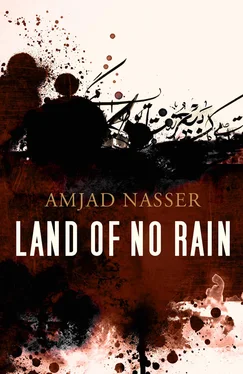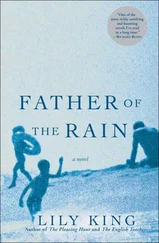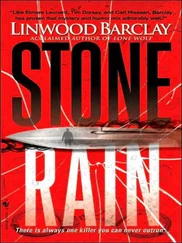Nasser Amjad - Land of No Rain
Здесь есть возможность читать онлайн «Nasser Amjad - Land of No Rain» весь текст электронной книги совершенно бесплатно (целиком полную версию без сокращений). В некоторых случаях можно слушать аудио, скачать через торрент в формате fb2 и присутствует краткое содержание. Год выпуска: 2014, Издательство: Bloomsbury Qatar Foundation Publishing, Жанр: Современная проза, на английском языке. Описание произведения, (предисловие) а так же отзывы посетителей доступны на портале библиотеки ЛибКат.
- Название:Land of No Rain
- Автор:
- Издательство:Bloomsbury Qatar Foundation Publishing
- Жанр:
- Год:2014
- ISBN:нет данных
- Рейтинг книги:4 / 5. Голосов: 1
-
Избранное:Добавить в избранное
- Отзывы:
-
Ваша оценка:
- 80
- 1
- 2
- 3
- 4
- 5
Land of No Rain: краткое содержание, описание и аннотация
Предлагаем к чтению аннотацию, описание, краткое содержание или предисловие (зависит от того, что написал сам автор книги «Land of No Rain»). Если вы не нашли необходимую информацию о книге — напишите в комментариях, мы постараемся отыскать её.
Land of No Rain — читать онлайн бесплатно полную книгу (весь текст) целиком
Ниже представлен текст книги, разбитый по страницам. Система сохранения места последней прочитанной страницы, позволяет с удобством читать онлайн бесплатно книгу «Land of No Rain», без необходимости каждый раз заново искать на чём Вы остановились. Поставьте закладку, и сможете в любой момент перейти на страницу, на которой закончили чтение.
Интервал:
Закладка:
When you reached the quarantine centre they gave you a tetanus shot and bandaged the wound. Your wife’s dull eyes looked at you from behind the glass screen in hope, or despair, or reproach. You couldn’t understand how her look could be so changeable, but you will never forget it. You weren’t allowed inside the glass enclosure, where dozens of victims lay. You stood outside it. You spoke to her. She couldn’t hear you. She seemed to understand what you were saying from your lip movements, because she nodded. Every now and then she had a coughing fit. You couldn’t hear it but you could judge its intensity by the way her thin body shook when she turned her head aside. You told her everything would be fine. You weren’t sure about that but it’s what one has to say in such situations. She moved her head slowly and looked you up and down with her dull eyes until they came to rest on your bandaged hand. You told her it was nothing, just a scratch. Night had fallen. The night held unpleasant surprises in the City of Red and Grey even before the plague spread, let alone after. You always avoided the night. The night, when people fell asleep and talked to themselves on the last buses and trains. The night, when drink brought their dark secrets to the surface and they vented the anger that was hidden behind their daytime masks — the masks that made them appear so composed to those who could be taken in — or jabbered in strange languages that sounded barbaric to ears that did not know what they were talking about.
The masked staff at the quarantine centre kept you in the hallway. There were others like you who had nowhere else to go. In the morning you crept out. The newborn day was a dome of grey. The city centre, usually crowded with pedestrians at all times of day and night, was almost empty. Few shops had opened their doors. Guards stood in front of them on the alert. The cafés where youngsters would drink coffee, smoke and shout at each other in high spirits were mostly closed. Mannequins gazed out from the shop windows like frozen idols, displaying the fashions of a hypothetical summer. The air was so thick you could touch it. The tall trees crouched like mythical creatures about to pounce. In the street the manholes that led underground were uncovered, and foul odours emerged from them. Soldiers armed with strange devices stood guard in front of sensitive government facilities. Intermittently and cautiously, spectres crossed from one pavement to the other. Police cars and ambulances ploughed through streets that were almost empty of cars, the sound of their tyres amplified in the muteness of the morning.
There had been a time when faces from all corners of the world had cut a path along the city’s narrow pavements and down the underground tunnels, when young men and women had embraced with a physical freedom that was sometimes embarrassing, when buskers had played music, sometimes cheerful and sometimes sad, in front of the big shops and at the entrances to the gloomy netherworld, in this grey-skied Babel crowned with the gold of the colonial era. It never occurred to you, even in your worst nightmares, that this city would descend into ruin and see the reappearance of primitive weapons, obsolete symbols and emotions you thought you had left behind in your long journey.
In the great square and the cobbled streets that radiated out from it in all directions, the desolation reminded you of an old film of the area, deserted after some disaster you don’t recall. But you do remember the hero of the film running through the empty streets, crossing the bridge with the two stone towers, entering one building and emerging from another, being ambushed by a wild gang, getting away and being on the run throughout the film. It’s as if the film was a terrible warning, except that in reality, but not in the film, people were moving about — some wearing masks on their faces and gloves on their hands, covering anything that would give away their colour, their features or their identity. Masked against the raging storm of fear and danger. Was it similar to what happened in the City of Siege and War? No. Maybe. You don’t know, because your nightmares have merged with reality. Your ability to judge has diminished. You can no longer be sure. Time has dissolved, and the events and the faces have merged together.
* * *
So you’ve returned. It’s been twenty years since you fled Hamiya. Of course, you don’t need anyone to remind you how many years it’s been, but you believe, as you put it during casual conversation on the balcony of your family’s house, between coughing fits, that time has unexpectedly played a cruel trick on you — how is it that things that should have disappeared have survived, while many faces have lost their details? That’s just a roundabout way of talking about time, because instead of saying time , you said things and faces . But the name doesn’t change anything, because time, as you know (do you really know?), does not defer to hopes, however fervent they might be, nor to resolutions, even if they are as firm as steel. Time has its own ways, direct or cunning, of achieving its purposes, and it never fails to hit the mark. No glancing blows, or blows outside the line. Time is also a train that does not prefer any particular station, even if it lingers here or hastens there. Maybe you can’t hear its whistle till it’s left, but its effects are visible on faces, on hands, in the way people stand and in the pictures hanging on the walls. The people who waited for you saw the whole map of your long journey on your face. Twenty years is not a number. In fact, in a case such as yours, it might be a life that has run its course. But do you know what’s good about it? That the days roll on, impervious, for everyone. They hone, erode and level everything they touch. Even your double, the person you used to be, the one who was frozen in his twenties by some mysterious disease, knows what that means.
* * *
Once upon a time you were considered a hero, or a conspirator. A brave young man who either — in the eyes of some abroad — took part in a heroic act, or whose head — in the eyes of others here — had been poisoned by imported ideas and who was implicated in a reckless act. You and your double, the man you used to be, both paid the price for what you did. While he survived as a ghost or a freak, growing no older and no younger, preserving a name and a life that had been nipped in the bud, you had to tramp the pavements and face the cold — battered by winds that blew your tattered sail far away. Now that matters have changed, the names and the acts balance out on the scales of insubstantial oblivion. You’re no longer a hero or a conspirator. Just an old man, half forgotten, coming back after twenty years of struggle, pursuing ideas that did not bring about much change in your country, and perhaps nowhere else either. Your double, the person you used to be, was tough on you. He seemed to have been waiting for this chance for a long time. In his head he had a long list of simmering questions. He cornered you. He crossed his arms over his chest, in the same old boyish way, and stood in front of you like a stubborn inquisitor. Apparently the interrogation you underwent at the National Security Agency wasn’t enough for him, even if the sentence against you had lapsed because of a general amnesty that included even those who had been given tougher sentences. When you arrived at the airport they let you leave with your relatives. They knew what had happened, of course, and they showed understanding for your situation, but they asked you to ‘drop in’ on them when you were ready. Your friend Salem, the former National Security officer, from the half of his memory that is still functioning, told you that in the NSA they never destroy a file, however old it is or however many officials come and go. ‘Because the NSA is a memory that never grows old or forgets,’ he said, like someone mouthing a text he has learnt by heart. You went to the star-shaped headquarters, that stone building you know so well, which from a distance used to look like a spaceship just landed from another planet. You were surprised at the change in the surroundings, where no one used to venture and where even birds dared not fly overhead. Now there were carts selling food, people authenticating documents, vendors selling cold drinks, petitioners and people who wrote official letters for a living, people of different ages, variously dressed, all stationed in front of the NSA building. You underwent the interrogation, twenty years late. They didn’t call it an interrogation; they just said, ‘Come and have a cup of coffee with us.’ You were not tetchy, as you often are. You were cold, even remote — I might almost say prudent — as though it were all about someone other than you. There was nothing new that you could add to the thick files piled in front of the three young, nameless officers, who were dressed in almost identical civilian clothes. You laughed when you saw the small pile. You were about to have a coughing fit. The officer who seemed to have the highest rank asked, ‘Why do you laugh?’ ‘Have I committed all that?’ you asked, pointing at the files heaped on the table. You knew that trick. You’d come across it in the Organisation, in psychological training to handle interrogation. It’s to make you feel they know every single detail about you and your doings. It’s here in these files, you can’t deny it! You thought to yourself, ‘It looks like these guys have preserved something of the traditions of the past.’ But still, you knew they had plenty on you. Your disguise had not misled them for long. They found you out shortly after you took refuge in the City Overlooking the Sea. They had eyes and ears there. That didn’t surprise you. You know the NSA was active in that city, which was a playground for numerous similar agencies. It may even have been the most active. There were also suspicions that there were infiltrators, despite the filters that new recruits had to pass through before they acquired membership of the Organisation. Penetration is to be expected in clandestine work. It can’t be avoided entirely. Political activists in Hamiya knew that when it came to bugging, surveillance, interrogation, propaganda and psychological warfare techniques the NSA was more advanced than its counterparts in neighbouring countries. Inside the star-shaped stone building, a place with almost no windows or balconies, perched alone on the edge of the wasteland, there were specialists in psychology, in reading between the lines, in propagating rumours and exposing disguises. The NSA had interrogators who did not use traditional methods for extracting confessions and information from political activists. They relied on cunning modern techniques they had acquired abroad. Penetration was inevitable, but the NSA spread rumours that exaggerated the extent of it, in order to keep the opposition forces off balance and make them have doubts about themselves.
Читать дальшеИнтервал:
Закладка:
Похожие книги на «Land of No Rain»
Представляем Вашему вниманию похожие книги на «Land of No Rain» списком для выбора. Мы отобрали схожую по названию и смыслу литературу в надежде предоставить читателям больше вариантов отыскать новые, интересные, ещё непрочитанные произведения.
Обсуждение, отзывы о книге «Land of No Rain» и просто собственные мнения читателей. Оставьте ваши комментарии, напишите, что Вы думаете о произведении, его смысле или главных героях. Укажите что конкретно понравилось, а что нет, и почему Вы так считаете.












